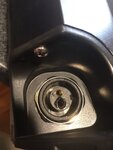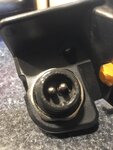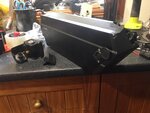The Reention battery connection/assembly is fairly commonly used by a decent number of e-bike OEM's, and while it's ok, there are certainly more electrically secure designs out there. The frame stiffness, and overall integration (casing to frame fit) is critical for the Reention to continue to consistently function properly. You can readily see that over time with typical bike wear and tear, the connection will likely pose future issues.
That said, It's really tough to build an ebike with all the higher wattage motors, higher speeds, higher capacity batteries, and modest quality bike components such as the suspension,drive train, other components, and still have enough money to build a quality frame that can appropriately house the battery design that Reention offers. I experimented with getting an ebike directly from one of the same manufacturers that Juiced and others like Surface used, and the frame and battery integration issue was the same that this poster experienced, and others on this thread said too they have experienced. It also had a larger battery (17.5 AH, 48 Volts). After the situation occurred and I learned from it, I decided it was the only, and last ebike I was willing to risk money buying direct from China in the same way firms like Juiced and M2S and BikTrix is doing. There is simply too much that can go wrong without proper quality control, excellent specification adherence, and manufacturer guarantees, top notch R&D, which is very costly until you get to a scale of at least 50,000 ebikes per year if you are a small and new firm in the industry, and not established with substantial revenues from regular bikes or other products like the big OEMS have.
So it is not all that surprising that Juiced (and also others like them) are having these issues, particularly with all that they are attempting to offer at the price points they have chosen. Larger firms like Trek,
Specialized, Giant, Accell (Raleigh, etc.) , and Yamaha just to name a few, can and do offer better frame quality and battery connection designs, but their price points are also higher than most of the models than Juiced offers, yet Juiced is typically including higher capacity batteries, and higher wattage motors than the larger firms are offering for their comparatively lower price points. So its really a trade off, in what you want from your ebike, at a certain price point. This battery assembly design and frame integration is just one of those trade offs. Could Juiced spend more and come up with a better configuration with more consistent quality ? Probably. Would people be willing to spend another few hundred to get this higher level of quality and electrical connection durability, frame stiffness, and super close tolerances ? Hard to say. Its not an easy solution for someone like Juiced or M2S to resolve without really deep R&D pockets, unless their Chinese factory is willing to pony up the extra design effort and money involved.
For the average consumer it is very hard to discern these quality differences, especially not seeing a Juiced or M2S or Biktrix first hand such as in a local store like you can with a Specialized or Trek or Yamaha or Giant or Raleigh (and others). Also, you have to know what to look for, and its not just with battery connections or frame/battery integration design.
My point is, while its good to let people know that these certain brands are having some of these issues on forums like EBR (as do all brands seem to have some sort of issues... i.e. none is 'perfect'), certain vendors of a certain size, and ones trying to offer a lot on 'performance', while maintaining a relatively lower price, are seeming to show as we have all seen on this forum, and many Ebike dealers have seen first hand, that certain pain points can keep re-occurring, and its just a risk you have to be willing to take when both buying on-line site unseen, and then wanting so much "performance" (usually speed, power, and range) at a lower price than some of the large brand names generally offer at much higher price points.



